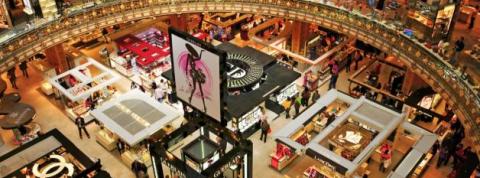
Department Store : Digitalization and upmarket
If they were models of commercial success a few years ago, the famous "malls", these spaces grouping together a multitude of brands, must now reinvent themselves to survive. The health crisis, but also and above all changing shopping habits and new customer expectations, what adaptations are necessary to ensure the sustainability of these concepts? Analysis.
Hybrid experiences and data management
The evidence is clear: e-commerce has experienced an unprecedented increase in recent years and now represents nearly 10% of market share, compared to 6% in 2019. Faced with this direct competition, physical stores, and more particularly shopping centers, are innovating and fighting back by focusing on their own advantages and their power of differentiation. To do so, the strategy is based on offering more than just a place to shop and on a real customer experience. Quality, targeting, personalization and immersion, the aim here is to rely on precise knowledge of needs. Thanks to ultra-connected stores, the use of web 3.0 and omnichannel tools, department stores combine physical experience and digital solutions in order to be the most aligned with customers' buying habits and expectations.
Read also our topic on the Internet of Things
The management and capture of data is essential to meet ever more personalized needs and to propose a totally customized offer. On the other hand, by joining these shopping malls, luxury brands are also able to secure real strategic showcases: less numerous brands but much more focused on the notion of lifestyle and storytelling. If e-commerce is seducing, the demand for physical experience is not left behind: according to a recent study, 79% of millenials want to try products before buying them and 59% are looking for advice from salesmen in store. To be where the web is not and to build a new off-line relationship is the challenge for this business model with a strong potential.
The beginnings of a premium model
If the goal is to be different and rethink the common space, department stores must also be able to create new dynamics and offer unique services and structures. This is illustrated by the establishment of exclusive pop-up stores in shopping malls. Gucci, Chloé, and Hermès, luxury brands are particularly sensitive to these spaces, which are perfect tailor-made showcases where the customer experience is at the heart of the project.
Unique, temporary and immersive, these ephemeral strategies also allow shopping centers to diversify and confirm their premium status.
Attractive retail offers, of course, but also adapted and targeted services.
To justify customer travel, department stores must be able to respond to ever more demanding requests and facilitate the customer's journey. Valet parking, concierge services, VIP services, but also a significant and varied catering offer. Indeed, the culinary offer is currently experiencing unprecedented growth, representing nearly 15% of shopping center space. This variety of offers and services is also accompanied by the creation of dedicated living spaces such as private lounges and even luxury hotels.
As Thibaut de La Rivière, director of Sup de Luxe, points out: "These are all assets that are in demand by a clientele that is increasingly connected and sensitive to details, and adaptations for shopping centers that are still in their infancy and that should see significant changes. To be continued...